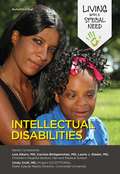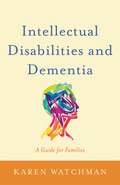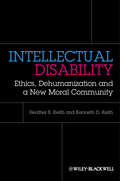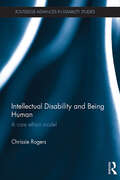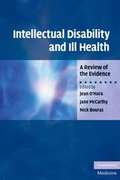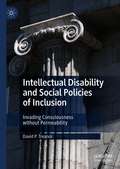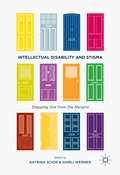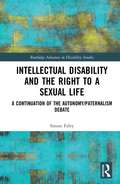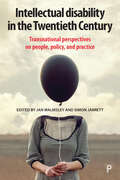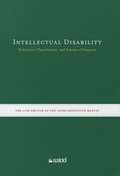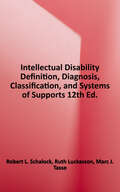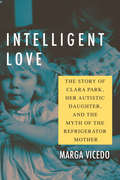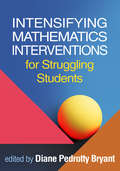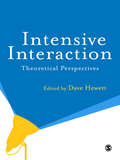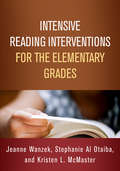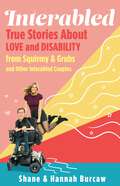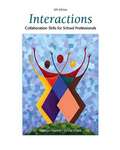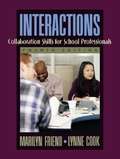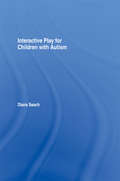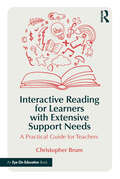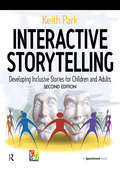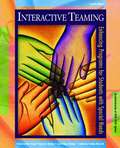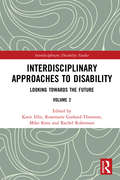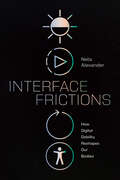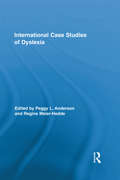- Table View
- List View
Intellectual Disabilities
by Autumn LibalNew parents who find out they're going to have a child with intellectual challenges are faced with many questions: Will she be able to function in the world? Will she have the same hopes and dreams as other children? Will her life be happy--or filled with sadness and failure? Along with the Brown family, you'll discover the answers to these questions as you read the story of Penelope Brown, a girl with Down syndrome. You'll see Penelope struggle to overcome others' ignorance and prejudice--and you'll watch her as she learns to follow her dreams.
Intellectual Disabilities and Dementia: A Guide for Families
by Karen WatchmanDrawing on the author's first-hand experiences with families, this book provides crucial, accessible information and answers the difficult questions that often arise when a family member with an intellectual disability is diagnosed with dementia. Linking directly to policy and practice in both dementia and intellectual disability care, this book takes an outcome-focussed approach to support short, medium and long-term planning. With a particular emphasis on communication, the author seeks to ensure that families and organisations are able to converse effectively about a relative's health and care. The book looks at how to recognise when changes in the health of a relative with an intellectual disability could indicate the onset of dementia, as well as addressing common concerns surrounding living situations, medication and care plans. Each chapter is structured to identify strategies for support whilst working towards outcomes identified by families as dementia progresses.
Intellectual Disability
by Heather Keith Kenneth D. KeithIntellectual Disability: Ethics, Dehumanization, and a New Moral Community presents an interdisciplinary exploration of the roots and evolution of the dehumanization of people with intellectual disabilities.Examines the roots of disability ethics from a psychological, philosophical, and educational perspectivePresents a coherent, sustained moral perspective in examining the historical dehumanization of people with diminished cognitive abilitiesIncludes a series of narratives and case descriptions to illustrate argumentsReveals the importance of an interdisciplinary understanding of the social construction of intellectual disability
Intellectual Disability and Being Human: A Care Ethics Model (Routledge Advances in Disability Studies)
by Chrissie RogersIntellectual disability is often overlooked within mainstream disability studies, and theories developed about disability and physical impairment may not always be appropriate when thinking about intellectual (or learning) disability. This pioneering book, in considering intellectually disabled people's lives, sets out a care ethics model of disability that outlines the emotional caring sphere, where love and care are psycho-socially questioned, the practical caring sphere, where day-to-day care is carried out, and the socio-political caring sphere, where social intolerance and aversion to difficult differences are addressed. It does so by discussing issue-based everyday life, such as family, relationships, media representations and education, in an evocative and creative manner. This book draws from an understanding of how intellectual disability is represented in all forms of media, a feminist ethics of care, and capabilities, as well as other theories, to provide a critique and alternative to the social model of disability as well as illuminate care-less spaces that inhabit all the caring spheres. The first two chapters of the book provide an overview of intellectual disability, the debates surrounding disability, and outline the model. Having begun to develop an innovative theoretical framework for understanding intellectual disability and being human, the book then moves onto empirical and narrative driven issue-based chapters. The following chapters build on the emergent framework and discuss the application of particular theories in three different substantive areas: education, mothering and sexual politics. The concluding remarks draw together the common themes across the applied chapters and link them to the overarching theoretical framework. An important read for all those studying and researching intellectual or learning disability, this book will be an essential resource in sociology, philosophy, criminology (law), social work, education and nursing in particular.
Intellectual Disability and Ill Health
by Jean O'Hara Jane Mccarthy Nick BourasPeople with intellectual disability often have health needs that go unrecognised and untreated; this may be because of difficulties in communication, diagnostic overshadowing, discrimination or indifference. There is concern that public health measures aimed at reducing the main health killers in the population will not address these issues for people with intellectual disability and may preferentially widen the inequality that already exists. This book is a comprehensive and systematic review of physical and mental health co-morbidities in people with intellectual disability. Such an evidence base is vital in shaping public health policy, healthcare commissioning and the development of more effective healthcare systems, as well as supporting better understanding and practice at an individual clinical level. This is essential reading for policy makers and commissioners of services, as well as individual practitioners across mainstream and specialist health and social care, in considering not only service developments but practice at the coalface.
Intellectual Disability and Social Policies of Inclusion: Invading Consciousness without Permeability
by David P. TreanorThis book explores why, after forty years of funded policies of social inclusion, persons living with an intellectual disability are still separated from the social fabric of neoliberal societies. David Treanor shows how the nature of the reform process is driven unnecessarily by the economic neoliberal paradigm, the cultural misconceptions of intellectual disability, and the inattention accorded to personal relationships between persons living with and without an intellectual disability. Treanor utilizes John Macmurray’s personalist philosophy, Julia Kristeva’s ontology of disability and Michele Foucault’s concept of bio-power to explain this phenomenon. The concepts in this book challenge current approaches to social inclusion and have radical implications for future practices.
Intellectual Disability and Stigma
by Katrina Scior Shirli WernerThis book examines how intellectual disability is affected by stigma and how this stigma has developed. Around two per cent of the world's population have an intellectual disability but their low visibility in many places bears witness to their continuing exclusion from society. This prejudice has an impact on the family of those with an intellectual disability as well as the individual themselves and affects the well-being and life chances of all those involved. This book provides a framework for tackling intellectual disability stigma in institutional processes, media representations and other, less overt, settings. It also highlights the anti-stigma interventions which are already in place and the central role that self-advocacy must play.
Intellectual Disability and the Right to a Sexual Life: A Continuation of the Autonomy/Paternalism Debate (Routledge Advances in Disability Studies)
by Simon FoleyOne of the perennial political/philosophical questions concerns whether it is ever justifiable for a third party to paternalistically restrict an adult’s freedom to ensure their own, or society’s, best interests are protected. Wherever one stands on this debate it remains the case that, unlike their non-impaired contemporaries, many intellectually disabled adults are subjected to a paternalistic regime of care. This is particularly the case regarding members of this population exercising more control of their sexuality. Utilizing rare empirical data, Foucault's theory of power and Kristeva’s concept of abjection, this work shows that many non-disabled people – including family members – hold ambivalent attitudes towards people with visible disabilities expressing their sexuality. Through a careful examination of the autonomy/paternalism debate this is the first book to provide an original, provocative and philosophically compelling analysis to argue that where necessary, facilitated sex with prostitutes should be included as part of a new regime of care to ensure that sexual needs are met. Intellectual Disability and the Right to a Sexual Life is essential reading for scholars, students and policy-makers with an interest in philosophy, sociology, political theory, social work, disability studies and sex studies. It will also be of interest to anybody who is a parent or a sibling of an adult with an intellectual disability and those with an interest in human rights and disability more generally.
Intellectual Disability in the Twentieth Century: Transnational Perspectives on People, Policy, and Practice
by Jan Walmsley and Simon JarrettWith contributions from distinguished authors in 14 countries across 5 continents, this book provides a unique transnational perspective on intellectual disability in the twentieth century. Each chapter outlines different policies and practices, and details real-life accounts from those living with intellectual disabilities to illustrate their impact of policies and practices on these people and their families. Bringing together accounts of how intellectual disability was viewed, managed and experienced in countries across the globe, the book examines the origins and nature of contemporary attitudes, policy and practice and sheds light on the challenges of implementing the UN Convention on the Rights of Persons with Disabilities (UNCPRD).
Intellectual Disability: Definition, Classification, and Systems of Supports (Eleventh Edition)
by The AAIDD Ad Hoc Committee on Terminology ClassificationThis Manual contains the most current and authoritative information and knowledge on intellectual disability, including best practice guidelines on diagnosing and classifying intellectual disability and developing a system of supports for people living with an intellectual disability.
Intellectual Disability: Definition, Diagnosis, Classification, and Systems of Supports
by Robert L. Schalock Ruth Luckasson Marc J. TasseThe AAIDD Manual leads the field in understanding, diagnosing, and classifying the construct of intellectual disability (ID). The 12th edition integrates the findings and developments of the last 10 years and presents the operational definition in a systematic approach to diagnosis, optional subgroup classification, and planning of systems of support for people with ID. In addition, the 12th edition examines the construct of the age of onset in light of the developments of the last 10 years and changes that criterion in a way that will be critically important for professionals in the field. The material in the 12th edition is presented in a user-friendly fashion and includes advance organizers for each chapter to facilitate easy access and understanding.
Intelligent Love: The Story of Clara Park, Her Autistic Daughter, and the Myth of the Refrigerator Mother
by Marga VicedoHow one mother challenged the medical establishment and misconceptions about autistic children and their parentsIn the early 1960s, Massachusetts writer and homemaker Clara Park and her husband took their 3-year-old daughter, Jessy, to a specialist after noticing that she avoided connection with others. Following the conventional wisdom of the time, the psychiatrist diagnosed Jessy with autism and blamed Clara for Jessy's isolation. Experts claimed Clara was the prototypical "refrigerator mother," a cold, intellectual parent who starved her children of the natural affection they needed to develop properly. Refusing to accept this, Clara decided to document her daughter's behaviors and the family's engagement with her. In 1967, she published her groundbreaking memoir challenging the refrigerator mother theory and carefully documenting Jessy's development. Clara's insights and advocacy encouraged other parents to seek education and support for their autistic children. Meanwhile, Jessy would work hard to expand her mother's world, and ours.Drawing on previously unexamined archival sources and firsthand interviews, science historian Marga Vicedo illuminates the story of how Clara Park and other parents fought against medical and popular attitudes toward autism while presenting a rich account of major scientific developments in the history of autism in the US. Intelligent Love is a fierce defense of a mother's right to love intelligently, the value of parents' firsthand knowledge about their children, and an individual's right to be valued by society.
Intensifying Mathematics Interventions for Struggling Students (The Guilford Series on Intensive Instruction)
by Diane Pedrotty BryantThis key resource for K–12 educators offers a systematic guide to delivering Tier 2 and 3 math interventions within a multi-tiered system of support. The volume explains critical math areas in which many students have difficulty--early numeracy, time and money measurement, number combinations, fractions, word-problem solving, algebra, and more. Leading experts describe relevant standards and show how to use data-based individualization to plan, monitor, and intensify instruction in each area. Beginning with bulleted guiding questions, chapters feature a wealth of evidence-based intervention strategies, lesson-planning ideas, and case examples. Reproducible instructional activities and planning forms can be downloaded and printed in a convenient 8 1/2" x 11" size.
Intensive Interaction: Theoretical Perspectives
by Dave HewettIntensive Interaction is an approach to teaching the fundamentals of communication to children and adults who have severe learning difficulties or autism, and who are still at an early stage of communication development. Its simplicity and effectiveness has been one of the major themes in the widespread practitioner dissemination that has taken place during the last twenty years. Despite the human simplicity of the approach, intensive interaction relates to, or is influenced in practice by, a wide range of interconnecting theories and academic standpoints. With contributions from leading authorities, Dave Hewett provides a comprehensive and detailed description of the theoretical landscape of a now established methodology. The most prominent related theories and issues are reviewed, with Intensive Interaction set within their contexts. Issues covered include: - the approach within education and the curriculum - intensive interaction within adult services - effects on organisational change and development - neurology and learning outcomes - intensive Interaction and the Central Triad of autism - emotional learning and development outcomes - adoption of Intensive Interaction Providing a timely theoretical and academic overview to Intensive Interaction practice, this book marks a substantial theoretical waypoint to future development of interactive approaches generally. It is a vital resource of in-depth knowledge for anyone studying Special Educational Needs and Education. Dave Hewett is an independent educational consultant and has published widely on Intensive Interaction since his role in its development.
Intensive Reading Interventions for the Elementary Grades (The Guilford Series on Intensive Instruction)
by Kristen L. McMaster Jeanne Wanzek Stephanie Al OtaibaPacked with easy-to-use tools and resources, this book presents intensive intervention strategies for K–5 students with severe and persistent reading difficulties. Filling a key need, the authors describe specific ways to further intensify instruction when students continue to struggle. Chapters address all the fundamental components of reading--phonological awareness, phonics and word recognition, reading fluency, oral language, language and reading comprehension, and writing to read. The authors discuss the design and implementation of intensive instruction and provide effective teaching techniques and activities. Grounded in the principles of data-based individualization, the book includes concrete recommendations for determining students' particular needs and monitoring their progress.
Interabled: True Stories About Love and Disability from Squirmy & Grubs and Other Interabled Couples
by Shane Burcaw Hannah BurcawYouTube sensations Shane and Hannah Burcaw are back with a groundbreaking, uproarious collection of essays and short stories about what it means to be in an interabled relationship.With their signature wit and hilarious voice, authors, bloggers, and entrepreneurs Shane and Hannah Burcaw have put together a true story collection of sweet and unforgettable love stories about interabled couples.Follow the lives of several couples as they navigate their love story in an ableist world. Sometimes tear-jerking, sometimes funny, and always heartwarming, this moving collection comprised of interviews and short stories - with interludes from Shane and Hannah about their own dating and marriage journey - will have readers laughing and sobbing as they discover true stories of love and commitment.
Interactions: Collaboration Skills for School Professionals
by Marilyn Friend Lynne CookTargeted at services for students with special needs, this text provides collaboration techniques between educators fraternity - special educators, general educators and related services professionals - to work towards effective communication framework.
Interactions: Collaboration Skills for School Professionals (4th Edition)
by Marilyn Friend Lynne CookInteractions, Fourth Edition, provides a cutting-edge look at how teams of school professionals-classroom teachers, special education teachers, and counselors-can effectively work together to provide a necessary range of services to students with special needs. This book addresses collaboration as a style, with accompanying knowledge and skills, which guides practices in many education efforts. As a result, future teachers learn how to collaborate with school professionals and families to help special education students who are more often being placed in general classroom settings.
Interactive Play for Children with Autism
by Diana SeachThis is a comprehensive guide to establishing shared play experiences that assist in the development of communication, social understanding and cognition. Easily accessible, and packed full of practical resources, the book defines the importance of play both developmentally and psychologically as having a major influence on the enrichment of meaningful interactions and children’s learning. Diana Seach expertly discusses how play enables children with Autism to: represent their knowledge of the world and their relationships with others spontaneously explore ways of thinking about themselves and the objects they encounter develop communication and companionship discover motivating ways to learn extend their imagination and creative potential. Those who live and work with children who have Autism and Asperger Syndrome will find Interactive Play for Children with Autism an invaluable tool when implementing strategies to develop interactive play in educational establishments, care settings and the family home.
Interactive Reading for Learners with Extensive Support Needs: A Practical Guide for Teachers
by Christopher BrumThis comprehensive guidebook shows teachers how to implement high-quality evidence-based interactive reading lessons for children with extensive support needs. It features step-by-step instructions for developing, implementing, and assessing shared reading lessons that are meaningful, engaging, and supportive of this population’s needs across cognitive, sensory, physical, and behavioral domains. Featuring templates to help readers organize critical information needed to plan and implement each lesson, as well as sample assessments to help identify learner interests, identify baseline skills, and monitor progress, the book is both practical and widely applicable across grade bands and curricula. Interactive Reading for Learners with Extensive Support Needs is key reading for teachers and literacy coaches who work with children with complex support needs, as well as faculty in personnel preparation programs in the areas of sensory disabilities, severe disabilities, and special education.
Interactive Storytelling: Developing Inclusive Stories for Children and Adults
by Keith ParkInteractive storytelling, where the story is spoken or chanted, began as a way to include individuals with severe and profound learning disabilities in larger group activities, whether children at school or adults in day services. The stories are performed in call-and-response - one person calls out a line and the rest of the group respond either by calling back the same line or by calling out a pre-arranged response - and require no previous experience in drama or storytelling. They can be performed anywhere, by anyone. Various stories are explored, ranging from folktales and pantomime to poetry, the works of Charles Dickens, Shakespeare and stories from the Old Testament. Each extract details the full call-and-response for performing the story. This approach to storytelling can be used by teachers and group facilitators in a variety of settings and with any group of children or adults, irrespective of their level of disability. This hands-on manual will enable teachers, therapists, parents and anyone working with children or adults in community settings to use performance and recital to bring stories, drama and poetry to life for people of all abilities. 'This book is a useful resource...is simply written...is especially appropriate for people working with children and adults with speech, language and communication difficulties.' - Child Language Teaching and Therapy.
Interactive Teaming: Enhancing Programs for Students with Special Needs (4th edition)
by Vivian Ivonne Correa Hazel Jones Carol Chase Thomas Catherine Voelker MorsinkInteractive teaming in special programs is a concept of service delivery for school-age students who are currently placed in special education programs or are at risk for referral to such programs.
Interdisciplinary Approaches to Disability: Looking Towards the Future: Volume 2 (Interdisciplinary Disability Studies)
by Rosemarie Garland-Thomson Rachel Robertson Katie Ellis Mike KentHow can a deep engagement with disability studies change our understanding of sociology, literary studies, gender studies, aesthetics, bioethics, social work, law, education, or history? Interdisciplinary Approaches to Disability (the companion volume to Manifestos for the Future of Critical Disability Studies) identifies both the practical and theoretical implications of such an interdisciplinary dialogue and challenges people in disability studies as well as other disciplinary fields to critically reflect on their professional praxis in terms of theory, practice, and methods. Topics covered include interdisciplinary outlooks ranging from media studies, games studies, education, performance, history and curation through to theology and immunology. Perspectives are drawn from different regions from the European Union to the Global South with chapters that draw on a range of different national backgrounds. Our contributors who write as either disabled people or allies do not proceed from a singular approach to disability, often reflecting different or even opposing positions. The collection features contributions from both established and new voices in international disability studies outlining their own visions for the future of the field. Interdisciplinary Approaches to Disability will be of interest to all scholars and students working within the fields of disability studies, cultural studies, sociology, law history and education. The concerns raised here are further in Manifestos for the Future of Critical Disability Studies.
Interface Frictions: How Digital Debility Reshapes Our Bodies (Sign, Storage, Transmission)
by Neta AlexanderIn Interface Frictions, Neta Alexander explores how ubiquitous design features in digital platforms reshape, condition, and break our bodies. She shows that while features such as refresh, playback speed, autoplay, and night mode are convenient, they can lead to “digital debility”—the slow and often invisible ways that technologies may harm human bodies. These features all assume an able-bodied user and at the same time push users to ignore their bodily limitations like the need for rest, nourishment, or movement. Building on the lived experiences of people with disabilities, Alexander explores alternative design solutions that arise from a multisensorial approach to communication. She demonstrates what can be gained from centering the nonaverage user, such as blind people who pioneered ways to control the playback speed of media, and Netflix subscribers with invisible disabilities like PTSD who successfully pushed the company to redesign its previews autoplay feature. Drawing on artworks, video games, and creative hacking by users with disabilities, Alexander challenges our understanding of media consumption, the attention economy, and the digital interface.
International Case Studies of Dyslexia (Routledge Research in Education)
by Peggy L. Anderson Regine Meier-HeddeDyslexia is a disability that exists in all countries that have high expectations for literacy. The inability to read in spite of normal intellectual potential represents one of the most puzzling educational challenges for literate societies, regardless of the culture or language. This book examines medical, psychological, educational, and sociological data from comprehensive case studies of preteen dyslexic children, in order to profile the disability as it occurs in seventeen different nations. Interviews with the children and their parents reveal how children with dyslexia are identified and treated around the world, and provide a look at various perceptions of dyslexia and its challenges. Researchers and practitioners in education, psychology, and health-related professions will find this case book to be an excellent reference. Parents of children with dyslexia will find the advocacy recommendations helpful.
